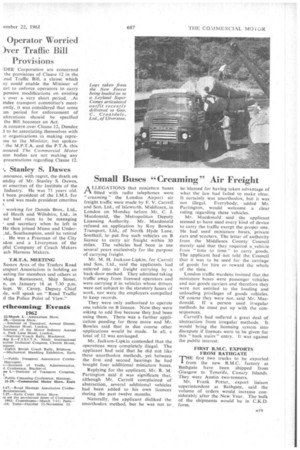Small Buses "Creaming" Air Freight
Page 23

If you've noticed an error in this article please click here to report it so we can fix it.
ALLEGATIONS that miniature buses fitted with radio telephones were " creaming " the London Airport air freight traffic were made by F. V. Carroll and Son, Ltd., of Isleworth. Middlesex, in London on Monday before Mr. C. J, Macdonald, the Metropolitan Deputy Licensing Authority. Mr. Macdonald refused an application by Roy Bowles Transport, Ltd., of North Hyde Lane, Southall, to put five such vehicles on B licence to carry air freight within 30 miles. The vehicles had been in use several years exclusively for the purpose of carrying freight.
Mr. M. H. Jackson-Lipkin, for Carroll and Son, Ltd., said the applicants had entered into air freight carrying by a back-door method. They admitted taking traffic away from licensed operators and were carrying it in vehicles whose drivers were not subject to the statutory hours of work, nor were the employers compelled to keep records.
They were only authorized to operate one vehicle on B licence. Now they were asking to add five because they had been using them. There was a further application pending for three more and Mr. Bowles said that in due course other applications would be made. In all, a total of 12 was envisaged.
Mr. Jackson-Lipkin contended that the operations were completely illegal. The applicant had said that he did not like • these unorthodox methods. yet between the first and second hearings he had bought four additional miniature buses.
Replying for the applicant, Mr. R. M. Partington said it was significant that, although Mr. Carroll complained of abstraction, several additional vehicles had been added to his own licences during the past twelve months. Naturally, the applicant disliked the unorthodox method, but he was not to be blamed for having taken advantage of what the law had failed to make clear. It certainly was unorthodox, but it was not illegal. Everybody, added Mr. Partington, would welcome a clear ruling regarding these vehicles.
Mr. Macdonald said the applicant seemed to have used every kind of device to carry the traffic except the proper one. He had used miniature buses, private cars and scooters. The letter of authority from the Middlesex County Council merely said that they required a_ vehicle from " time to time" to carry goods. The applicant had not told the Council that it was to be used for the carriage of goods for hire or reward the whole of the time.
London traffic wardens insisted that the miniature buses were passenger vehicles and not goods carriers and therefore they were not entitled to the loading and unloading privileges of goods vehicles, Of course they were not, said Mr. Macdonald. If a person used irregular methods he must put up with the consequences.
Carroll's had suffered a great deal of abstraction from irregular methods. It would bring the licensing system into disrepute if licences were to be given for this " back stairs" entry. It was against the public interest.
























































































